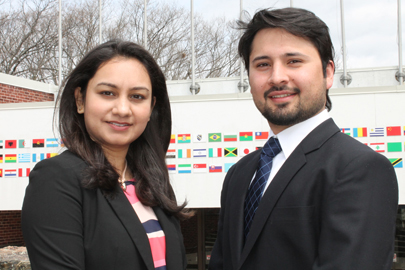Field Projects provide ‘practical, hands-on business experience’

Nishima Maini, MBA '15, and Muhammad Farooq, MBA ’15
These are just a sampling of the challenges students enrolled in Fields Projects — an immersive consulting course at Brandeis International Business School — have grappled with this academic year. Under the supervision of a faculty member and a company-assigned mentor, students apply the skills and knowledge they’ve learned in the classroom to evaluate, analyze, and solve problems facing real companies.
“The goal is for students to feel like they’re part of an actual consulting team,” says Professor William Oliver, who’s taught the course for three years. “In addition to gaining practical, hands-on experience — which is a boost to their résumés — students learn important real-world skills, such as how to build and maintain relationships with clients, how to productively respond to feedback and how to work as a team.”
The school also offers specialized versions of the course in both Sustainable Business and Real Estate. Last semester, Real Estate students worked with organizations including strategic planning company T3 Advisors, commercial real estate group JLL and the City of Boston's Department of Neighborhood Development.
Before his course starts, Oliver develops projects with a wide range of companies from multi-billion dollar firms to pre-revenue start-ups. He is on the hunt for “substantive business challenges that offer students the opportunity to make a bottom-line impact,” he says.
Next, Oliver matches students to project teams. Each team draws on a different mix of professional experiences, cultural backgrounds and functional capabilities. “I tell our clients: ‘Think of this group of students in the same way you would a top-of-the-line consulting firm,’” he says. “I want them to expect that level of performance and professionalism.”
Throughout the semester, students work closely with clients in face-to-face meetings and by videoconference. “The trajectory follows a predictable pattern,” says Oliver. “At first, the problem seems insurmountable. But the more numbers the students crunch, the more executive interviews they do and the more data they gather, a solution eventually starts to take shape.”
Nishima Maini, MBA '15, was a part of the group tasked with creating a new market entrance plan for Infor, and she echoes that sentiment. Her team began by analyzing the potential market for Infor’s product by looking at macroeconomic data the country they hoped to enter. They then modeled the country’s healthcare budget alongside medical trends that might impact the future. “The data told us there was demand for healthcare IT; we decided to move ahead,” she says.
Then came the difficult part: coming up with a list of potential joint venture partners for Infor. Using case studies, trade show research and personal connections, Maini and her team generated a list of 20 possibilities that they ultimately winnowed down to two. “We set milestones, helped each other and created a team environment with lots of healthy debate,” she says. “Over time, we developed a strategy we felt confident would be successful.”
The course culminates in a final presentation to the client. Infor brought Maini’s team to its New York City offices for a few days and put them up in a Times Square hotel. Maini’s team presented its analysis to a suite of executives, including Charles Phillips, Infor CEO.
“Their presentation was an unmitigated success,” says Oliver. “The CEO of this $4 billion company was engaged throughout the entire presentation, asked many questions, and agreed with the team's call for action. The students presented well, handled Q&A well, and comported themselves as top-shelf professionals. In the end, the CEO turned to his lieutenants for confirmation, then told the team Infor would go ahead with the next steps of its recommendations.”
This semester, Muhammad Farooq, MBA ’15, is taking it further by working for Infor on another assignment. His team is investigating a potential software partnership with a cloud-based healthcare company. “In the classroom, I’ve learned how to segment the market for a product or service, evaluate the value proposition and synergies between two companies, and introduce a new product to the target market,” he says. “This project is giving me the opportunity to put those lessons to use on a real-life problem.”
Farooq, who plans to pursue a career in consulting, says the course is an “outstanding professional” experience. “It’s a confidence builder that offers transferable consulting skills essential for my job search across various industries.”
Categories: Business, Student Life





